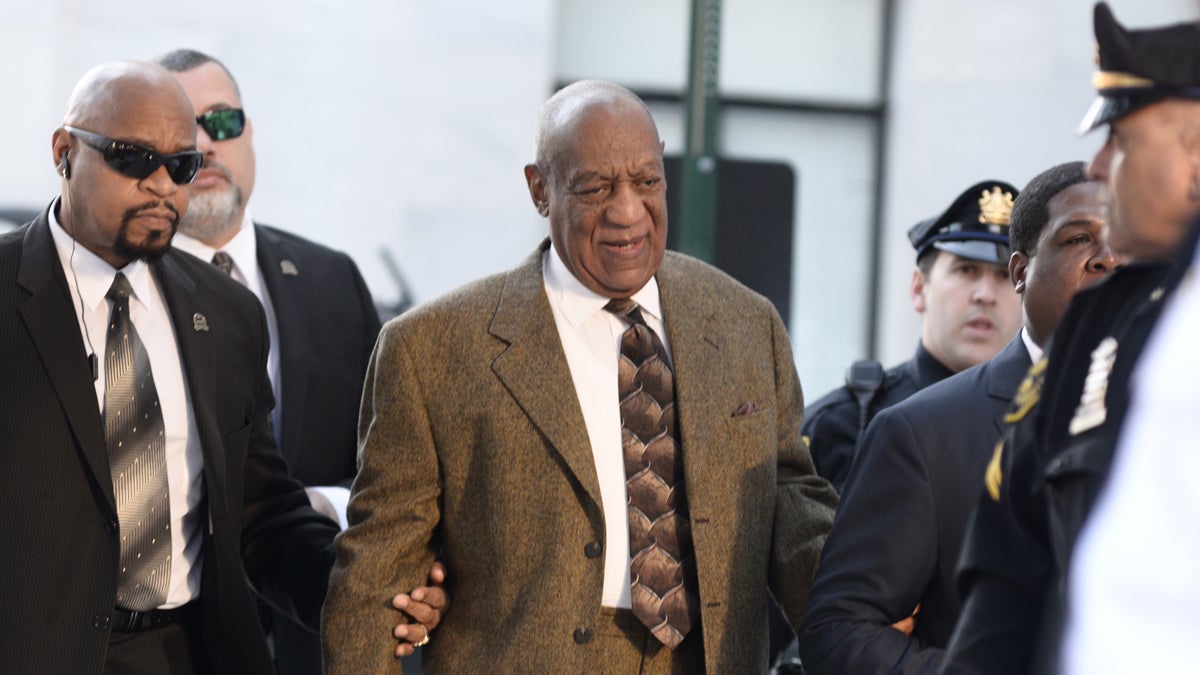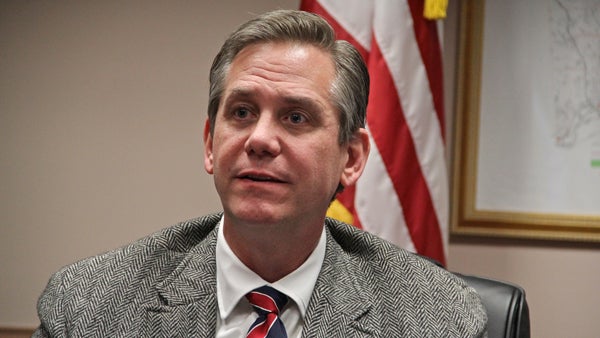UPDATED: Cosby non-prosecution agreement an act of ‘justice,’ says Castor

Bill Cosby is escorted to a court appearance at the Montgomery County Court House in Norristown, Pa. (Bastiaan Slabbers/for NewsWorks)
It was a long day for former Montgomery County District Attorney Bruce Castor.
As star witness for comedian Bill Cosby’s defense team in the matter of a “binding” agreement not to charge the celebrity with assaulting a woman in his home in 2004, Castor endured six hours of questioning.
First, lawyers for comedian Bill Cosby ambled through their argument, establishing Castor’s bona-fides as a district attorney before delving into an intensive excavation of Castor’s decision not to prosecute Cosby in 2005.
In January 2005, Andrea Constand made a complaint to police in Ontario, where she lived, that Cosby had sexually assaulted her the previous year. Police in Canada shared the complaint Cheltenham Township police and, ultimately, the Montgomery County district attorney’s office, which oversees the area where one of Cosby’s homes — and the site of alleged assault — is located.
A month later, Castor issued a press release that said he would not be prosecuting Cosby.
“I did not think there was any possibility that the case could ever get better,” said Castor of the criminal case.
In a nutshell, Castor said, it was problems with Constand’s accounts of the events and the knowledge that she had taped — perhaps illegally — conversations she had had with Cosby following the alleged incident. Castor said he feared the evidence would not be admissible at trial and that using it may have even constituted a crime in itself.
“Her actions on her own … had created a credibility issue for her that could never be improved upon,” said Castor. Attempts to introduce what Castor called “inconsistencies” in Constand’s story to the record were objected to and sustained.
Castor said that, in issuing a press release saying he would not prosecute, he was acting as a “sovereign of the commonwealth of Pennsylvania” and that his decision meant “that Mr. Cosby would not be prosecuted, no matter what.” Former Montgomery County District Attorney Bruce Castor testified Tuesday at the Montgomery County Court House in Norristown, Pa. in the case of Bill Cosby. (Emma Lee/WHYY)
Former Montgomery County District Attorney Bruce Castor testified Tuesday at the Montgomery County Court House in Norristown, Pa. in the case of Bill Cosby. (Emma Lee/WHYY)
Under cross-examination led by Assistant District Attorney M. Stewart Ryan, Castor faced questions about statements he made to the press between 2005 and 2015 about the case. Compared with the immense attention he described pouring into the press release that he says grants Cosby immunity, Castor’s memory of other contacts with the press contact was decidedly fuzzy.
“I don’t recall,” he said, to at least six different questions about things he had said during interviews or press conferences related to the case.
Judge Steven T. O’Neill took also took a turn questioning Castor. O’Neill asked him to explain why he did not use recognized means of offering immunity, which in Pennsylvania require the involvement of a judge.
“If you thought there was an agreement, why did you not put it into writing?” said O’Neill. “Do you know why you didn’t do that?”
“It was unnecessary,” said Castor. “I concluded there was no way for the case to get any better.”
For much of the day, Cosby sat stony-faced, occasionally conferring with counsel Monique Pressley. When O’Neill began to grill Castor, Cosby smiled.
When Ryan brought up the allegations in Constand’s civil case, Castor said, “If I could have proven all of those things, Mr. Cosby would have handcuffs on him right now.”
With that comment, Cosby put his head in his hand.
It’s unclear how many motions will be heard before the most basic step in a criminal case — the preliminary hearing — can go forward in this case. Cosby’s lawyers have filed several challenges to the prosecutors and the evidence that would be admitted.
If the comedian does stand trial and is convicted of the three charges of aggravated indecent assault against him, he would face up to 10 years in prison.
O’Neill announced that he would make a ruling from the bench Wednesday on the non-prosecution agreement.
WHYY is your source for fact-based, in-depth journalism and information. As a nonprofit organization, we rely on financial support from readers like you. Please give today.

